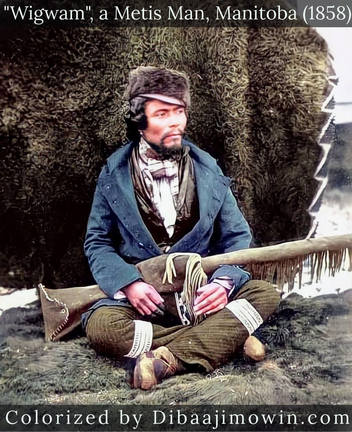Annotation:Buffalo Chase: Difference between revisions
No edit summary |
No edit summary |
||
| (One intermediate revision by the same user not shown) | |||
| Line 3: | Line 3: | ||
{{TuneAnnotation | {{TuneAnnotation | ||
|f_tune_annotation_title= https://tunearch.org/wiki/Annotation:Buffalo_Chase > | |f_tune_annotation_title= https://tunearch.org/wiki/Annotation:Buffalo_Chase > | ||
|f_annotation='''BUFFALO CHASE'''. Canadian, Reel (cut time). Canada, Manitoba. B Flat Major ('A' part) & F Major ('B' part). Standard tuning (fiddle). ABB. "Buffalo Chase" was composed by Métis fiddler [[biography:Andy DeJarlis]] (1914-1975), of Woodridge, Manitoba. For Indigenous peoples on the plains, bison were an essential element of their ways of life and were the single most important source of food and other materials. Because so much depended upon the success of the hunt, ritual and ceremony were of vital importance. When the great bison herds were all but extinguished by the late nineteenth century (through overhunting by both white and, arguably, Métis populations), the lives of the peoples who depended on them were equally devastated and radically changed. | |f_annotation=[[File:Wigwam2.png|400px|right|thumb|]]'''BUFFALO CHASE'''. Canadian, Reel (cut time). Canada, Manitoba. B Flat Major ('A' part) & F Major ('B' part). Standard tuning (fiddle). ABB. "Buffalo Chase" was composed by Métis fiddler [[biography:Andy DeJarlis]] (1914-1975), of Woodridge, Manitoba. For Indigenous peoples on the plains, bison were an essential element of their ways of life and were the single most important source of food and other materials. Because so much depended upon the success of the hunt, ritual and ceremony were of vital importance. When the great bison herds were all but extinguished by the late nineteenth century (through overhunting by both white and, arguably, Métis populations), the lives of the peoples who depended on them were equally devastated and radically changed. | ||
|f_source_for_notated_version= | |f_source_for_notated_version= | ||
|f_printed_sources= | |f_printed_sources= | ||
Latest revision as of 18:25, 24 March 2021
X:1 T:Buffalo Chase N:From the playing of Métis fiddler Andy DeJarlis (1914-1975, Woodridge, Manitoba) M:C| L:1/8 Q:"Fast" D:London EB 102, Andy DeJarlis - "Jolly Old Time Music" (1965) D:https://www.youtube.com/watch?v=F9aKoAAaVyU D:https://www.slippery-hill.com/content/buffalo-chase Z:Andrew Kuntz K:Bb F2|BcBA Bcdf|gagf d2f2|gagf gfdc|BGG2 G2z2| GFGA B2 Bc|dedB G2AB|c2 cc cdcB|AFFF F2GA| B2{c}BA Bcdf|gagf d2f2|gagf gfdc|BGG2 G2 z2| EDEF G2GA|BABc d2ga|bfdB c<BAc| B2 {c}BA B2|| K:F |:AB|cccc cdcB|AFFF F2GA|B2{c}BA BcdB|G2 GG G2AB| c2cc cdcB|Acfg a2fg|afcf gece |f2{g}fe f2:|


